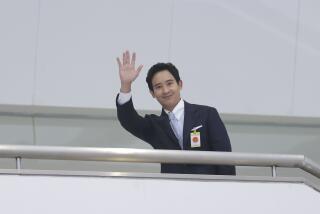Turkish Court Snuffs Out Islamist Welfare Party
ANKARA, Turkey — Turkey’s highest court dissolved the Islamic-oriented Welfare Party on Friday and banned six of its leaders from politics, accusing them of undermining the country’s long tradition of secular rule during a stormy year in government.
The decision was a new triumph for the army-led secularist elite that forced Necmettin Erbakan, the Welfare Party leader, to resign as prime minister in June. Some of Turkey’s Western allies criticized the ban on this predominantly Muslim country’s largest party as a blow to its shaky democracy.
Erbakan, 71, and five other Welfare members of parliament were stripped of their seats and barred from political activity for five years. The party’s assets were seized.
The Constitutional Court cited Erbakan’s speeches and acts of his government as reasons for its ruling.
As prime minister, Erbakan formed closer ties with Iran and Libya and allowed civil servants to work shorter hours during the Muslim holy month of Ramadan. He once boasted that Welfare’s Islamic-guided principles would prevail in Turkey, whether the transition was “sweet or bloody.”
“It is unthinkable to have a democracy without political parties,” Chief Justice Ahmet Necdet Sezer wrote for the majority in the 9-2 ruling. “But it doesn’t mean that no limits should be put on them.”
Erbakan, appearing unruffled at a news conference, called the ban “a grave judicial mistake” and vowed to file a complaint against Turkey with the European Court of Human Rights in Strasbourg, France.
The party, which regrouped after being outlawed by the army in 1971 and 1980, is being reorganized again under a new name, Virtue, and “will grow even stronger,” Erbakan said.
Turkey is a North Atlantic Treaty Organization member and key American ally in the region, with its unique role straddling the Balkans, the Middle East and the Caucasus. But the Turks, who were received warmly in Washington last month, in the last few weeks have been rebuffed by the Europeans and the Islamic world.
European Union nations, which last month cited Turkey’s poor human rights record in shelving its membership application, were quick to condemn the ban. “We are concerned at the implications for democratic pluralism and freedom of expression and will be discussing this urgently with our European partners,” said British Foreign Secretary Robin Cook.
*
In Washington, State Department spokesman James P. Rubin said the court ruling damages confidence in Turkey’s democratic, multi-party system. “The answer to many of Turkey’s problems is to enhance democracy, to adopt reforms that would allow greater freedom of expression and wider political participation,” he said.
Turkey’s army generals, self-appointed guardians of secular tradition since the 1920s, campaigned openly for the court ruling. The generals have been working to dislodge the Islamists since they finished first with 21% of the vote in the December 1995 parliamentary elections and emerged six months later at the head of a coalition government.
Political analysts caution that the Turkish ban has parallels to Algeria, where the army set off a still-bloody conflict in 1992 by canceling elections to prevent an Islamic party from taking power.
“If [Turkey’s] pro-secular elite does not reach some kind of peaceful accommodation with the Islamists, some of these people could eventually take up arms against the state,” a Western intelligence source said.
Welfare leaders urged their rank and file to stay calm. “We have decided to stage no mass protest actions, nothing. This will not be Algeria, ever,” said Hashim Hashimi, a member of parliament.
Prime Minister Mesut Yilmaz, who succeeded Erbakan with the armed forces’ blessing, has met little resistance so far in rolling back his predecessor’s modest Islamist reforms. Last fall, Yilmaz closed hundreds of Islamic clerical training schools that the army accused of brainwashing Turkish teenagers.
“Whenever a party is closed in a democracy, it is an occasion for sorrow,” the prime minister said in response to the court ruling. But he emphasized that the decision was final and urged Islamist politicians to “evaluate” it and “proceed in the most fitting manner.”
The secular establishment is counting on the ban to weaken the Islamists by setting off a divisive struggle to succeed Erbakan as their leader. One contender is Tayyib Erdogan, Istanbul’s fiery but controversial mayor who once asserted that “we Islamists see democracy as a tool to bring us to power.”
If Islamists can stay united under a new banner, they could increase their vote share to 24% in the next parliamentary elections, according to recent opinion polls.
Welfare’s support comes from villages and urban slums, where many people feel left out of Turkey’s Western-oriented economic boom, alienated by decades of official corruption and alarmed by a steady erosion of traditional social values. Erbakan’s government gave these places better roads and sewers, along with badly needed health clinics, cheap bread and free food packages.
More to Read
Sign up for Essential California
The most important California stories and recommendations in your inbox every morning.
You may occasionally receive promotional content from the Los Angeles Times.










